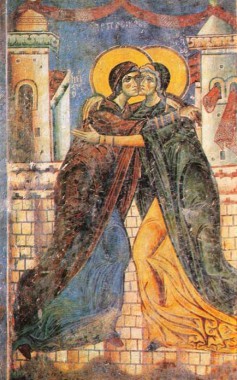Dear Father John: after the Our Father, we pass the peace of Christ, and I  ponder that moment and its purpose in worship. Is it not for greeting one another in Christ–‘May the peace of Christ be with you?’ And that is how I pass the peace of Christ. Unfortunately, I too often come to Mass with the worries of the day swirling about me, and that little dust storm takes a while to settle down. It may not have settled completely when I pass the peace of Christ to the parishioners on either side of me. And I wonder how I possibly could be passing on to someone something which I do not have. Then, a few moments later, we ask the Lamb of God to grant us His peace. Not only did I not have it earlier, I now plead with God to grant me some share. I suppose my cheeky question is: why do we pass the peace of Christ, then turn around and ask Him for it?
ponder that moment and its purpose in worship. Is it not for greeting one another in Christ–‘May the peace of Christ be with you?’ And that is how I pass the peace of Christ. Unfortunately, I too often come to Mass with the worries of the day swirling about me, and that little dust storm takes a while to settle down. It may not have settled completely when I pass the peace of Christ to the parishioners on either side of me. And I wonder how I possibly could be passing on to someone something which I do not have. Then, a few moments later, we ask the Lamb of God to grant us His peace. Not only did I not have it earlier, I now plead with God to grant me some share. I suppose my cheeky question is: why do we pass the peace of Christ, then turn around and ask Him for it?
Thank you for being so sincere in asking this question. Too many times we allow ourselves to ignore questions like these. Loving God with all our minds involves seeking each day a greater communion with him, and that includes a greater understanding of his inexhaustible mysteries. So you have given good example to all of us by posing the question, by seeking to clarify a point that causes you a bit of confusion.
Liturgical Richness
We could answer this question from two angles. The first would be a strictly liturgical angle. In rites that differ from the Ordinary Roman Rite of the Mass, the passing of the peace can happen at other moments. Good theological reasons abound for the various traditions. I don’t think that is the core of your question, however, and I would hate to get sidetracked with liturgical debates. So we will simply accept the reality of our Ordinary Roman Rite and reflect on the spiritual conundrum that you have laid out for us.
In the end, the richness of the liturgy surpasses any individual’s ability to keep it all in mind during the celebration of the Mass. What matters is that we learn to live each moment of the Mass consciously, finding ways to unite ourselves to the meaning of liturgy through prayerful, attentive participation. Certainly, the more we learn about the theological meaning of each aspect of the ritual, the better chance we will have of participating more consciously. Yet, it is also possible to have vast knowledge and weak faith, in which case active participation will be tough. So let’s just address your question. Some of our readers may want to comment on the different liturgical usages.
Ambiguous Terminology
I think you may be running into a snag with the term “the passing of the peace.” The phrase seems to imply that I pass peace to the person next to me the way I would pass the salt to someone next to me at the table. It’s understandable to think of it that way, because of the words we use. But something else is actually going on.
At the passing of the peace, we are not actually attempting to directly give divine peace to those around us. Rather, we are expressing our sincere desire that God will give them that gift. By saying, “peace be with you,” we are, in essence, offering a prayer on behalf of the people around us. It is very similar to saying something like, “May God bless you.” Obviously, when we say that, we are not pretending that we ourselves possess the capacity to impart divine blessings by our own strength. We are simply wishing, prayerfully, that God’s blessing will come to that person.
Proper Context
This element of the Mass is better understood when we consider its context. The exchange of peace takes place in the context of preparation for approaching the altar to offer ourselves to God and to receive Holy Communion. In St. Matthew’s Gospel, Jesus gives us a strong warning about that particular moment of worship:
Therefore, if you bring your gift to the altar, and there recall that your brother has anything against you, leave your gift there at the altar, go first and be reconciled with your brother, and then come and offer your gift (Matthew 5:23-24).
This is an application of Jesus’ admonition that the second greatest commandment (to love our neighbor as ourselves) is linked directly to the first greatest commandment (to love God with all our heart, soul, mind, and strength). St. John the Evangelist made this connection very clear in his First Letter:
If anyone says, “I love God,” but hates his brother, he is a liar; for whoever does not love a brother whom he has seen cannot love God whom he has not seen (1 John 4:20).
So we are not supposed to approach the altar unless we are living in basic charity with our neighbor. If we are holding something against or refusing reconciliation with another person, it’s as if we were doing the same thing towards God himself, that person’s creator and redeemer. And so it would be a contradiction to come to receive Holy Communion, which is an expression of our desire for union with God and a means to achieve that union, while at the same time refusing to work for reconciliation and union with our neighbor.
Through the rite of exchanging the peace of Christ, we give concrete expression to our sincere desire to love our neighbor. How could we be hating our neighbor if we are wishing them divine peace? And so, this exchange of peace becomes a beautiful expression of supernatural love for one another, which opens our hearts to receive more worthily and fruitfully the grace of God. It is a fitting preparation for our approach to the altar and to Holy Communion.
But Why “Peace”?
It is significant that we wish the peace of Christ upon others, and that we ask for Christ’s peace, instead of his blessing or grace, for example.
In the biblical tradition, peace is a very rich concept. It implies much more than simply an absence of war and strife. It implies more than simply a passing feeling of contentment, relaxation, and order. It implies the fullness of joy and life that can only be attained and experienced in a climate of justice, order, truth, respect, and good will. Saying “peace” in biblical language is akin to what we moderns might imply by the phrase “peace and prosperity.” By wishing this for those around us, and asking Jesus to give it to us, we are invoking our hope and faith in God who is the source and sustainer of all good things, material and spiritual.
The short answer to your question, then, is simply this: By expressing our sincere desire that those around us might receive the fullness of God’s blessings, we open our hearts to be better able to receive that fullness ourselves. And by asking God to grant it to us before we approach the altar to receive Holy Communion, we humbly admit our absolute need for God’s grace in order to experience the happiness we long for.
+
Art for this post on exchanging peace of Christ at Mass: The Embrace of Elizabeth and the Virgin Mary, artist unknown, 1191, PD copyright expired pursuant to the Yugoslav copyright act of 1978, Wikimedia Commons.


